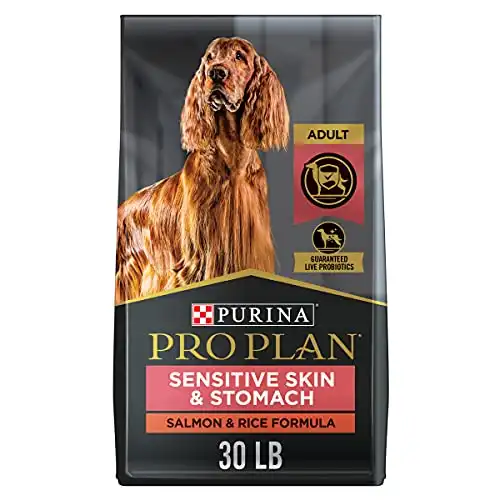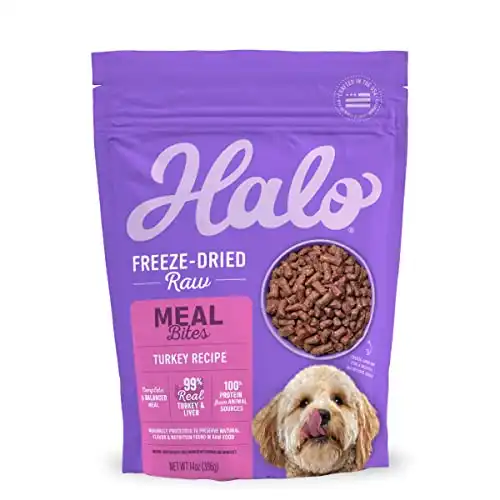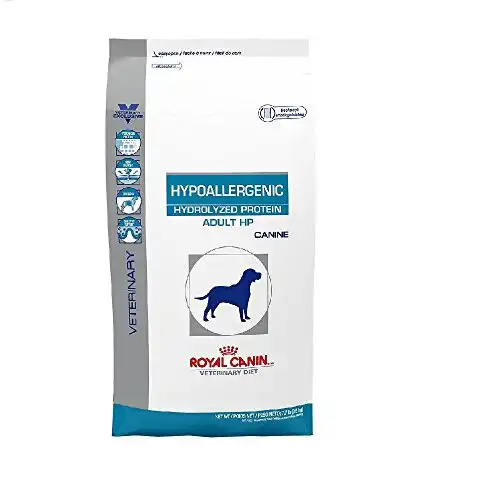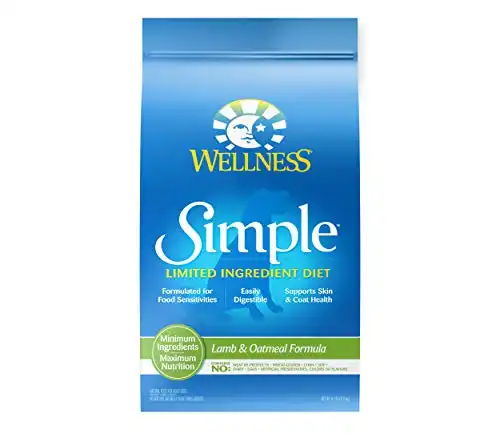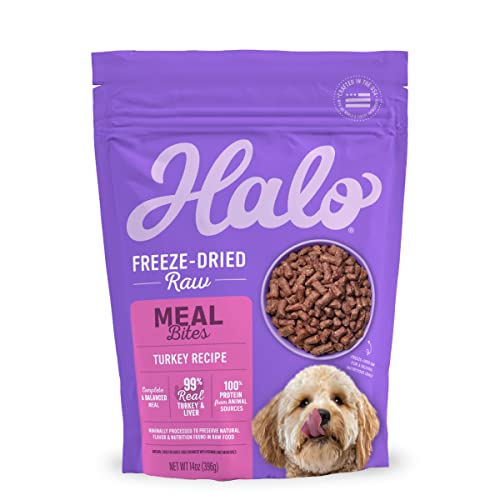Does your dog suffer from food allergies? If so, it’s important to choose a dog food that won’t cause side effects like vomiting, rashes, breathing problems, and even seizures.
You can prevent your pet from suffering these symptoms by picking dog foods with the “right” ingredients.
We’re here to help guide you through the good and bad ingredients and the best dog food for dogs with allergies.
In a hurry? Here are our favorite formulas when it comes to allergy-friendly dog food:
Must-Have Ingredients

Here are the most important nutrients to look for in dog food:
Protein
This macronutrient supplies energy for your dog through its building blocks: amino acids.
Amino acids are a key component to building and maintaining muscle tissue.
Fat
This includes saturated and polyunsaturated fats.
This provides your dog with the most concentrated energy source and 2 times more calories than protein and carbs.
Fats also supply omega-3 and omega-6 fatty acids that help your pup maintain a healthy skin and coat.
Vitamins
These are organic compounds that dogs, and humans, need in small amounts.
Vitamins can dissolve in either fat or water. Vitamins like A, B, C, D, E, and K provide various benefits.
They improve several functions like blood circulation, the nervous and immune system, and more.
What’s the best way for your dog to get their vitamins?
Make sure they’re eating dog food with a variety of protein and plant-based sources of vitamins.
Only use vitamin supplements as directed or instructed by your vet.
Minerals
This is another important type of nutrient in dog food.
The two main types are macro-minerals like calcium, phosphorus, potassium, and magnesium; and micro-minerals like iron, zinc, copper, and iodine.
Both types of minerals are equally important to your dog’s health.
Minerals are critical for various functions in a dog’s body.
The crucial functions in your pup’s daily life are much like yours and include blood circulation, strong bones, oxidants, a nervous system, and fluid balance.
It’s especially important for puppies to get twice the amount of calcium compared to that consumed by adult dogs.
When choosing the best dog food for dogs with allergies, keep in mind that certain protein sources are the leading cause of allergic reactions among dogs.
This includes foods like beef, chicken, egg, wheat, soy, and dairy.
That might seem like nearly 100% of the ingredients in dog food, so what’s left?
The good news is there are other sources of protein as well as hypoallergenic diets.
Here are some of the best options:
Venison
Deer meat contains less protein than beef but products made with venison meal are concentrate and contain a high amount of protein.
It’s an excellent option for dogs with allergic reactions to beef, chicken, and other proteins.
Since venison also has less fat and cholesterol than beef, your dog gets an added health benefit.
The meat is also a great source for:
- Vitamin B
- Iron
- Phosphorus
- Zinc
Venison can also help to maintain a canine’s energy levels and many of them like the taste.
Another plus for venison is it’s classification as a “novel protein.”
This can keep dogs with food-related allergies from having any allergic reactions such as skin irritations.
When dealing with an allergy, preventing the triggering of conditions is just as important as treating them.
Fish
This is a healthy source of protein for dogs and is often added to commercial dog foods.
Similar to venison, fish causes fewer allergic reactions than other protein sources like beef and chicken.
One of the main benefits of this protein source is it’s high count of omega-3 fatty acids.
This can provide various health benefits for your doggy including a healthier skin and coat.
Fun Fact: There’s over 15,300 fish species worldwide.
However, certain types are used more frequently in commercial dog food. They include:
- Flounder
- Herring
- Salmon
- Swordfish
- Tuna
- Walleye
- Whitefish
Watch out for fish like tuna and swordfish since they tend to have higher amounts of mercury in them, which could lead your dog to health issues.
Another big issue is the source of the fish in commercial dog food.
For example, if you’re concerned about the fish’s safety, make sure to research where the swimming schools are sourced.
You should generally avoid fish sourced from farms to maintain distance from pollution and disease.
Rabbit
This is another great option for dogs that have allergic reactions to traditional protein sources.
Rabbit is all-white meat, so it contains less fat than other types.
However, it still provides lots of nutrients, making the protein a great choice for high-energy dogs.
It’s non-intuitive to think small game to be high in protein but rabbit is actually higher in protein than many other sources.
This includes:
- Beef
- Chicken
- Duck
- Lamb
- Pork
- Turkey
- Veal
The protein provides several benefits to your dog’s health.
They promote energy, muscles, organs, nervous system, and even cell growth and regeneration.
Another healthy plus is rabbit meat is lower in cholesterol than most other protein sources in dog food. The rabbit’s healthy fats can improve your dog’s joints and coat.
Like venison, rabbit meat is also a novel protein.
A great option for canines with food allergies and which can even relieve symptoms caused by allergens.
Novel proteins can “reset” canines’ systems so their daily diet can get back on track.
Ingredients to Avoid for Dogs with Allergies
Here are some of the most common ingredients in dog foods that trigger symptoms:
- Beef
- Chicken
- Dairy
- Egg
- Lamb
- Pork
- Soy
- Wheat
Protein sources like fish and rabbit can cause allergic reactions but it’s less common than other sources like beef, chicken, and eggs.
It’s also important to note that if your dog is allergic to one ingredient it’s probably not the only one.
Your pooch is probably also allergic to a host of other proteins.
This macronutrient is the most common cause of food allergies among dogs.
If you suspect your dog is allergic to more than one ingredient in commercial dog food, then it’s important to take your canine to the animal clinic for testing.
Your veterinarian can give guidelines on how to pinpoint which ingredients are causing the unwanted side-effects in your dog.
Dog Food Diets For Allergic Dogs
Limited Ingredient Diets
As the name suggests, this type of dog food has fewer ingredients than regular dog food.
This is especially important as the ingredient lists of dog chow brands have become longer.
This has led many pet owners to start feeding their pets limited ingredients diets.
Sometimes keeping things simple works.
The goal is to provide your canine with food that contains a small number of high-quality ingredients.
This approach is also known as the limited ingredient diet (LID). This is an ideal option for dogs with sensitive stomachs.
When there are fewer ingredients in a commercial food it reduces the chances for the animal to have a digestion problem.
Pros
In fact, one of the main benefits of LIDs is it becomes easier to isolate the ingredients that are causing your dog’s digestion issues.
There’s usually one source of protein and one source of carbs.
They’re often fewer common ingredients like lamb or duck for protein, and sweet potatoes or avocados for carbs.
Dogs are less likely to have food allergies when the ingredients in their food are natural ingredients.
When picking a LID it’s important to look for dog foods with fewer ingredients that still provide the nutrients your pet needs.
That includes vitamins, minerals, and antioxidants.
This helps to support your dog’s health, skin and coat, blood circulation, and immune system.
The main benefit of limited ingredient dog food is it’s easier to deal with food allergies your dog may have.
That’s done by introducing new ingredients that are as nutritious as they are delicious.
This allows you to remove certain ingredients that are triggering your dog’s food allergies.
Cons
The main drawback of limited ingredient dog foods is it could result in your pet getting fewer nutrients. For example, different types of proteins contain different amino acids.
So, while LIDs may have one main protein and carb source it’s important to research the food’s other ingredients.
This will help to make sure your canine is getting all their vitamins, minerals, enzymes, and antioxidants they need to stay healthy.
Novel Ingredient Diets
What’s a novel ingredient diet all about?
This is a type of dog food that includes proteins and ingredients your pet might not have tasted before.
This often refers to alternative protein sources like bison, salmon, and duck, which are more uncommon in commercial foods.
The irony is many of these ingredients have become more common in today’s dog foods as hot products become mainstream.
However, the key point is these might be “new” to your specific dog.
So in theory, beef or chicken could be “novel foods” to your canine if they’ve never eaten them before.
Pros
If your dog has food allergies then novel ingredients are one of the best ways to deal with them.
In fact, sometimes your dog may not exhibit any sensitivity to ingredients.
However, over time they can develop reactions to certain ingredients from eating the same foods over and over again.
The actual symptoms may vary as well and include itchy skin, stomach problems, or vomiting.
Novel ingredients remove the common ingredients found in dog food and replace them with less common protein sources.
Make sure to read the ingredient list thoroughly so you can avoid possible issues with so-called hypoallergenic and novel diets.
Here’s why. Sometimes the primary protein source is rabbit, venison, or salmon. However, the dog food might still contain a small amount of chicken and beef.
If that’s the case, then your pet could still have allergic reactions to the food even if the problematic ingredients are in much smaller quantities than other products.
In fact, sometimes dogs aren’t even allergic to meat products contained in a certain food.
The side-effects are instead caused by other ingredients like eggs or grains.
When you are at the store looking for hypoallergenic dog food, be sure to not only look for new meat sources but also new sources for carbs, like grains.
Sometimes simply picking a grain-free food can solve the problem.
Cons
It’s important to note that some veterinarians argue that feeding novel ingredients to a dog is a bad idea.
In the past, such foods required a prescription, which limited the number of pets allowed to eat such food.
It could become a potential problem.
That’s because pet owners are taking on the responsibility of the animal doctor.
Without the needed know-how required, their pets could develop health issues while consuming new exotic foods like kangaroo.
Do use caution, and read labels!
So while dog owners can give their pets novel food it doesn’t mean they should.
It’s critical to get the professional opinion of a veterinarian about whether you should start feeding your pooch novel ingredients, and if so, which ones.
Prescription and Veterinary Diets
Just like people doctors, veterinarians can recommend prescription and veterinary foods for your dog.
One thing to keep in mind is these products can be quite pricey even for a small quantity. So it’s important to get the correct facts on these specialized diets before jumping into one.
Prescription dog foods have existed for quite a while.
Today you can find specialized dog food for a wide range of health conditions including itchy skin and allergies. In fact, the number of prescription dog foods has spiked in recent years thanks to research and development.
Fun Fact: English businessman James Spratt invented the first commercial pet food over 150 years ago around 1860.
This was after he saw ship crews feeding dogs leftover biscuits. Spratt then developed the first dog biscuit, which was a blend of beef blood, wheat meals, and veggies like beetroot.
Meanwhile, the history of prescription pet food dates to 1930 when veterinarian Dr. Mark Morris Sr. was hired to develop a meat-free dog food.
This was during the rationing years of World War II.
In the 1930s the meat-free dog food was a practical option since the standard met dogs’ nutritional needs while not requiring companies to add meat to their products.
Today such prescription diets have become quite common and are easily obtained through veterinarians.
Pros
One of the biggest benefits of prescription dog food is its high-quality ingredients that are found in many premium foods sold in supermarkets. It’s very important to read the ingredients list and find out where the items are sourced.
Prescription dog foods are also designed to treat a wide range of health conditions including:
- Diabetes
- Digestive Disorders
- Food Allergies
- Heart Health
- Joint Problems
- Kidney Disease
- Liver Disease
- Metabolic Stress
- Skin Allergies
- Thyroid Issues
- Urinary Tract Infection
There’s some debate about how effective these products are for treating these conditions. That’s because the ingredients are often made with materials that are lower in quality than premium dog food.
Cons
There’s some debate about whether non-meat protein sources can provide dogs with all the nutrients they need. It’s believed domesticated dogs probably evolved from grey wolves, which survive on a nearly 100% carnivorous diet.
The big question mark is whether plant-based protein sources are as good as meat sources. Dr. Morris argued that pet food doesn’t need to contain fresh meat. He believed their nutritional needs could be met from other sources like eggs, fish, milk, and soybeans.
Another issue is the sky-high price tag of prescription dog foods. They’re quite high even compared to ultra-premium brands in supermarkets and local stores. In many cases the ingredients are low-quality versus super-premium dog foods yet they are roughly the same price. Always make sure to do your homework about individual brands of prescription and veterinary dog foods.
This brings us to one major drawback. Sometimes “prescription” dog food doesn’t contain any special ingredients compared to what the standard commercial foods comes with. The vet only needs to tell you what your dog is and isn’t allergic to for you to figure out the rest.
A related issue is these products often have little regulation. So it can be tough to determine exactly how a product’s ingredients can help with certain health conditions your dog has. The problem with such lack of regulation is it can be tougher to determine exactly what you’re getting in a product and if it can improve your dog’s health.Best Dog Food for Allergies
Best Dog Food for Dogs with Allergies: In-Depth Reviews
Focus is a Purina Pro Plan product for dogs with sensitive skin or stomach. It’s formulated for all breed sizes and is available in two flavors: Salmon & Rice and Lamb & Oatmeal.
The main ingredient of this dog food is real salmon. It also includes oatmeal, rice, omega-3, and omega-6 fatty acids, and zinc.
The product contains no wheat, corn, or soy. There are also no poultry by-products or artificial colors or flavors. This dry dog food does contain prebiotic fiber to improve a dog’s digestive health.
Features
- Contains no wheat, corn, or artificial colors or flavors
- Prebiotic fiber for good digestion
- Contains oatmeal and rice
- Omega-3 and omega-6 fatty acids
- Main ingredient is salmon
Pros
- Makes skin healthy and coat beautiful
- Dogs like flavor
- Prevents red skin irritations
Cons
- A few reports that skin allergies got worse
- Older recipe
Feed Me is a turkey-based gourmet dried dog food. The food provides complete nutrition for canines. It includes some prime ingredients that aren’t usually found in dog foods today.
The ingredients list includes: Ground turkey with turkey heart, liver, bone, herring oil, and mixed tocopherols.
This product provides several benefits for pooches. It contains natural ingredients with no artificial preservatives, is freeze-dried, and is easy to serve.
Since it’s freeze-dried, it just needs a little water to get ready and also has a crunchy texture. Feed Me also includes ingredients that are easy to digest and promote a shiny and healthy coat.
Features
- Guarantee for safety and satisfaction
- Hypoallergenic and good for dogs of all ages and breeds
- Can improve breath, digestion, and coat
- Made from free-range turkey
- No grains, fillers or artificial coloring or preservatives
Pros
- Limited ingredients
- Dogs like the flavor
- Good for both big and small breeds like these
Cons
- Hard to find
- No fruits or veggies
- High price range
Best Hypoallergenic Dog Food Reviews
This dog food from Royal Canin features a hydrolyzed protein formula. It contains proteins and rice that are nutritionally complete and easy to digest.
This dog food also contains omega-3 fatty acids and chelated minerals that the dog’s body can digest easily. It’s a fantastic option for dogs with sensitive digestive systems and skin.
The company also does research and testing for the optimal formulation for nutritional requirements that are breed and symptom-specific for dogs
Features
- Easy-to-absorb chelated minerals
- Hydrolyzed soy protein
- Rice for simple starch
- Ingredients support the dog’s digestive system
- Omega-3 fatty acids
Pros
- Good for old dogs
- Can improve overall health
- Improves stomach issues
Cons
- Some dogs dislike taste
- Very pricey
Best Limited Ingredient Dog Food for Allergies
This limited-ingredient dog food is made from a short but complete list of ingredients that provide all the nutrients your dog needs. The food includes a single protein source, flaxseed for healthy skin, and probiotics. Wellness has a team of animal nutrition experts and scientists, working hard to develop a game-changing pet food. The company spends a lot of time and energy on developing natural pet foods with an emphasis on sustaining initiatives while protecting the environment.
Features
- Subscribe to save 5%
- Quality lamb is a single protein source
- No wheat, gluten, fillers, or artificial additives
- Easy digestible carbs
- Made in the USA
Pros
- Improves digestion
- Good for dog allergies
- Healthier skin and coat
Cons
- Some dogs have oatmeal allergies, so not good for some dogs
- Can be hard to digest
Most Common Dog Allergies
Before looking for the best dog food for dogs with allergies it’s important to know some of the most common dog allergies.

Food Allergies
This is the most common type of allergy among dogs.
The symptoms can range from mild to severe so it’s essential to know the common symptoms since they can be signs of chronic allergies.
Here are some of the symptoms to look out for:
- Scratching or biting skin
- Itchy ears or tails
- Coughing and asthma
- Digestion problems
- Licking skin
- Sneezing
- Bacterial or yeast skin infections
- Snoring
- Scabs or lesions on skin
- Hair loss
- Itchy, watery, or bloodshot eyes
- Itchy or irritated skin
Flea Allergies
This causes various skin problems for dogs.
The reaction is due to the flea’s saliva rather than the bite and results in irritation and inflammation of the skin.
The saliva of one flea can cause the epidermis to itch so it’s important to take basic steps for flea control.
Environmental Allergies
Various environmental factors can also trigger allergies.
They include outdoor sources like pollen and grass and indoor triggers like cleaning chemicals and dust mites.
It’s important to know your dog’s allergies so you can reduce their exposure to those variables.
Key Takeaways
We’ve just discussed food allergies among dogs and how they affect your choice of commercial dog food.
You can find a wide range of options including limited ingredient and hypoallergenic food products.
We have compiled these options for best dog food for dogs with allergies to help keep your canine happy and healthy. We hope this article has helped you and your pooch!

